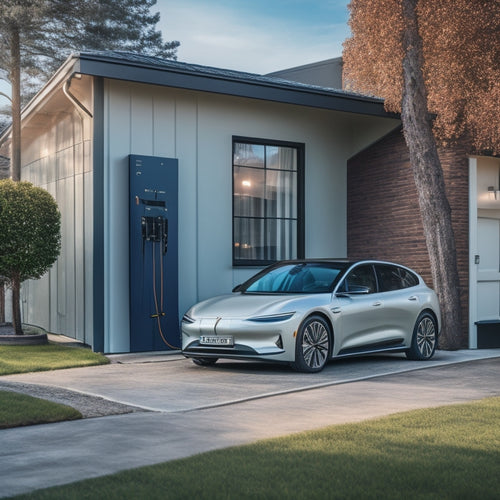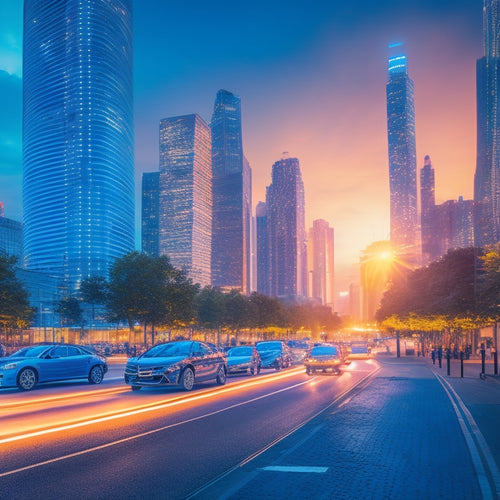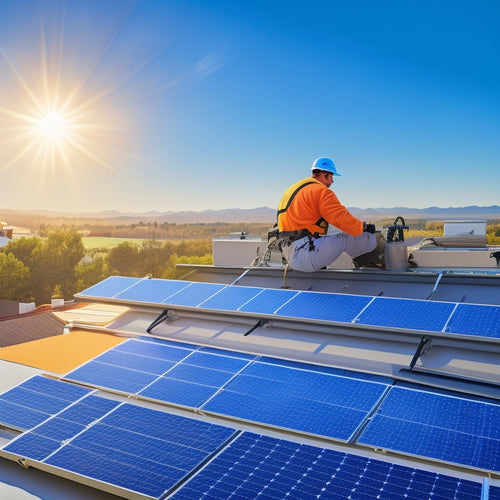
Best Solar-Powered Security Cameras for Outdoor Use
Share
You're looking for a reliable and efficient way to monitor your outdoor space without worrying about cables or battery replacements, and that's where solar-powered security cameras come in. These cameras utilize the power of the sun to operate, providing a cost-effective and eco-friendly solution. Top models like the Ring Stick Up Cam, Reolink Argus 3, and Arlo Pro 3 offer high-quality video, motion detection, and advanced night vision capabilities. When choosing the best solar-powered security camera for your outdoor space, consider key features like solar panel efficiency, motion detection, and weather resistance. As you examine your options, you'll find the perfect blend of security, convenience, and sustainability.
Key Takeaways
- Consider top-rated solar-powered security cameras like Ring Stick Up Cam, Reolink Argus 3, and Arlo Pro 3 for outdoor use.
- Look for cameras with high-efficiency solar panels, motion detection features, and advanced analytics for optimal performance.
- Ensure the camera has weather resistance, night vision, and high-quality video resolution for reliable outdoor operation.
- Check the camera's IP rating, material quality, and construction for durability and resistance to harsh weather conditions.
- Consider factors like battery life, charging efficiency, and installation flexibility when choosing the best solar-powered security camera for outdoor use.
Top Solar-Powered Security Cameras
You're looking for a reliable and eco-friendly way to keep your property secure, and solar-powered security cameras fit the bill. With advancements in solar technology, these cameras are now more efficient and effective than ever.
Leading the pack is the Ring Stick Up Cam, boasting an impressive 1080p HD video quality and motion detection capabilities.
The Reolink Argus 3 is another top contender, offering 2K resolution and a wide 130-degree viewing angle.
Both of these cameras seamlessly integrate with your smart home setup, allowing you to monitor your property from the comfort of your couch or on-the-go.
The Arlo Pro 3 is another popular option, featuring a weather-resistant design and advanced night vision capabilities.
With solar-powered security cameras, you can enjoy peace of mind knowing your property is protected while also reducing your carbon footprint.
Stay ahead of the game with these top-of-the-line cameras, designed to provide you with unparalleled security and convenience.
Benefits of Outdoor Solar Cameras
Outdoor solar cameras offer a multitude of benefits that make them an attractive option for homeowners and businesses alike.
You'll enjoy a range of advantages that enhance your security setup while also contributing to a more sustainable future.
Here are the benefits you can expect:
-
Cost savings: Solar-powered cameras eliminate the need for battery replacements or wiring, reducing your overall expenses and energy consumption.
-
Eco-friendly technology: By utilizing the power of the sun, you're reducing your carbon footprint and promoting a cleaner, greener environment.
-
Increased flexibility: Solar cameras can be installed in remote areas or locations where traditional power sources are limited or unavailable.
-
Low maintenance: With fewer moving parts and no batteries to replace, solar cameras require minimal upkeep and repair.
-
Enhanced security: With a reliable and consistent power source, you can rest assured that your solar camera will continue to monitor your property, even in the event of a power outage.
Key Features to Consider
When selecting a solar-powered security camera, it's vital to prioritize key features that align with your specific needs and preferences. You want a camera that can keep up with your demands, providing exceptional performance and reliability.
First and foremost, evaluate the solar panel efficiency. A high-efficiency panel guarantees your camera stays powered even on cloudy or low-light days. Look for panels with high conversion rates and durable construction to withstand harsh outdoor conditions.
Next, think about motion detection features. You want a camera that can accurately detect and alert you to potential threats. Features like customizable motion zones, sensitivity adjustments, and real-time alerts will give you peace of mind.
Additionally, contemplate cameras with advanced analytics, such as object detection and facial recognition, to further enhance security.
Other essential features to reflect on include weather resistance, night vision, and video quality. You'll also want to verify the camera integrates seamlessly with your existing security system and is compatible with your smartphone or tablet.
Top Brands and Models
From top-tier brands to innovative newcomers, the solar-powered security camera market boasts a diverse range of exceptional models, each catering to unique needs and preferences.
You're spoiled for choice when it comes to finding the perfect model that meets your specific requirements.
Some top brands and models to take into account include:
- Reolink Argus 3: A budget-friendly option with 2K resolution and a rechargeable battery
- Ring Stick Up Cam: A versatile camera that can be used indoors or outdoors, with a battery life of up to 6 months
- Blink XT2: A wireless camera with 1080p resolution and motion detection capabilities
- Arlo Pro 3: A high-end option with 2K resolution, weather resistance, and advanced motion detection
- Honeywell Lyric C1: A feature-rich camera with 720p resolution, motion detection, and geofencing capabilities
When comparing models, reflect on factors such as resolution, field of view, weather resistance, and motion detection capabilities to find the best fit for your outdoor security needs.
Battery Life and Charging
Frequently, homeowners find themselves wondering how long their solar-powered security cameras will last on a single charge. The answer lies in the battery capacity and solar panel efficiency. A higher-capacity battery and more efficient solar panel mean longer battery life.
| Solar Panel Efficiency | Battery Life |
|---|---|
| 20% | 2-3 months |
| 25% | 4-6 months |
| 30% | 6-12 months |
| 35% | 1-2 years |
As you can see, a small increase in solar panel efficiency can greatly impact battery life. When choosing a solar-powered security camera, look for models with high-efficiency solar panels and large-capacity batteries. This will guarantee you get the most out of your camera, even on cloudy days or during periods of low sunlight. Remember, a longer battery life means less maintenance and more peace of mind. With the right combination of solar panel efficiency and battery capacity, you can enjoy uninterrupted surveillance and protection for your home.
Weather Resistance and Durability
You'll want to make certain your solar-powered security camera can withstand the elements, so look for models with water and dust protection, capable of operating in extreme temperatures.
You'll also want to check if the camera's materials are corrosion-resistant to prevent damage from moisture and salt air.
Water and Dust Protection
When it comes to outdoor security cameras, weather resistance and durability are essential aspects to take into account.
You need a camera that can withstand the elements, from rain to dust, to guarantee your property is protected 24/7.
To guarantee water and dust protection, look for cameras with the following features:
- IP66 or higher rating, which guarantees protection against powerful jets of water and dust
- Weather-resistant housing made of high-quality materials, such as polycarbonate or metal
- Sealed connectors and gaskets to prevent water ingress
- Dust-tight construction to prevent dirt and debris from entering the camera
- Protective coatings or treatments to prevent corrosion and wear
Extreme Temperature Tolerance
Temperature fluctuations can be just as damaging as water and dust, so it's vital to choose a solar-powered security camera that can tolerate extreme temperatures. You need a camera that can handle scorching heat, freezing cold, and everything in between.
Look for cameras with a wide operating temperature range, typically between -20°C to 50°C (-4°F to 122°F).
When shopping for a solar-powered security camera, consider the climate adaptability of the device. Can it thrive in extreme temperature conditions, or will it malfunction? A camera that can adapt to various climates is fundamental for outdoor use.
You want a camera that can withstand temperature extremes, ensuring continuous monitoring and protection of your property.
Be sure to check the manufacturer's specifications for temperature tolerance. A reliable solar-powered security camera should be designed to operate efficiently in diverse environmental conditions.
Corrosion-Resistant Materials
Rugged outdoor environments demand cameras built to last, and that's where corrosion-resistant materials come in.
You need a camera that can withstand harsh weather conditions, from torrential rains to scorching sun, without compromising its performance.
Corrosion-resistant materials guarantee your camera remains functional and durable, even in extreme outdoor conditions.
Look for cameras made with the following material types:
- Stainless Steel: Provides exceptional corrosion resistance and durability.
- Anodized Aluminum: Offers a protective layer against corrosion and wear.
- Polycarbonate: A lightweight, impact-resistant material that can withstand harsh weather.
- IP67-Rated Housing: Assures protection against dust and water ingress.
- UV-Resistant Coatings: Shields the camera from damaging UV rays.
Video Quality and Night Vision
High-stakes security demands crystal-clear video evidence, and your solar-powered security cameras should deliver. You need to see every detail, day or night, to guarantee your property's safety.
When it comes to video quality, you're looking for a resolution that provides a clear user experience. Compare the resolutions of different models, considering factors like 1080p, 2K, or 4K. A higher resolution means a more detailed video, which can make a significant difference in identifying suspects or analyzing incidents.
Night vision is equally vital, as it allows you to capture footage even in low-light conditions. Look for cameras with infrared LEDs or advanced night vision capabilities that can illuminate objects up to a certain distance. This feature guarantees you don't miss a thing, even in the darkest hours.
When evaluating night vision, consider the camera's lux rating, which measures its sensitivity to light. A lower lux rating indicates better low-light performance.
Installation and Maintenance Tips
When setting up your solar-powered security camera, you'll need to decide on a mounting location that provides an ideal view while also guaranteeing the camera's solar panel receives sufficient sunlight.
You'll also want to take into account weatherproofing essentials, like sealing any gaps around the camera's housing or cables, to make certain it can withstand the elements.
Mounting Location Options
Across your property, you'll want to strategically position your solar-powered security cameras to maximize their effectiveness. This means considering factors like mounting height, camera angles, and potential blind spots.
When selecting a mounting location, keep the following in mind:
-
Corners: Ideal for capturing footage of multiple directions at once, reducing blind spots.
-
Doorways: Monitor entry and exit points, providing a clear view of who's coming and going.
-
Rooflines: Raised positions offer a wider field of view, but may require additional support.
-
Fence posts: Discreet and easily accessible, perfect for monitoring perimeter activity.
-
Garage or shed walls: Provide additional coverage without drawing attention to the camera.
Weatherproofing Essentials
Positioned to brave the elements, your solar-powered security cameras need strong weatherproofing to guarantee uninterrupted performance. You can't risk having your cameras compromised by rain, snow, or extreme temperatures.
When installing your solar-powered security cameras, be certain to follow the manufacturer's weatherproofing guidelines. This may include sealing any openings or gaps with waterproof sealants, securing cables and wires to prevent water ingress, and angling the camera to prevent water accumulation.
Proper weatherproofing also involves careful installation techniques. Avoid installing your cameras in areas prone to waterlogging or flooding. Instead, opt for raised locations that assure good airflow and drainage.
Consider the environmental impact of your installation as well. Avoid drilling into trees or sensitive ecosystems, and choose installation materials that minimize waste and reduce your carbon footprint.
Frequently Asked Questions
Do Solar-Powered Cameras Have a Limited Recording Capacity?
You're wondering if solar-powered cameras have limited recording capacity? Well, it depends on the battery life and recording quality you need - some can store weeks' worth of footage, while others may cap out after a few days.
Can I Use Solar-Powered Cameras for Indoor Surveillance?
You're wondering if solar-powered cameras are suitable for indoor surveillance, and the answer is yes! You'll appreciate the camera flexibility, allowing for indoor placement, and the convenience of solar power, making it a powerful addition to your security setup.
Are Solar-Powered Cameras Compatible With Smart Doorbells?
You'll find that solar-powered cameras can integrate with smart doorbells, but you'll need to take into account integration challenges and prioritize battery efficiency to guarantee seamless functionality, otherwise, you'll face power outages and poor performance.
Can I Install Solar-Powered Cameras Myself or Do I Need a Professional?
You can install solar-powered cameras yourself, enjoying DIY advantages like cost savings and flexibility, but make certain to follow essential installation tips to avoid common mistakes and guarantee a secure, hassle-free setup.
Do Solar-Powered Cameras Require a Wi-Fi Connection to Function?
You're worried you'll be stuck with a dead camera in the middle of nowhere, but don't worry, solar-powered cameras don't necessarily need Wi-Fi to function; they can store footage locally, and with high solar efficiency, their battery lifespan is extended, giving you peace of mind.
Related Posts
-

5 Essential Tips for Buying EV Charging Systems Online
When purchasing an EV charging system online, you'll want to make sure you're making an informed decision. First, det...
-

Why Cities Need Smart Charging Infrastructure Now
You're about to experience a tidal wave of electric vehicles hitting your city's streets, and it's essential you're p...
-

3 Essential Steps for Solar Electricity Installation
To guarantee a successful solar electricity installation, you'll need to follow three essential steps. First, assess ...


